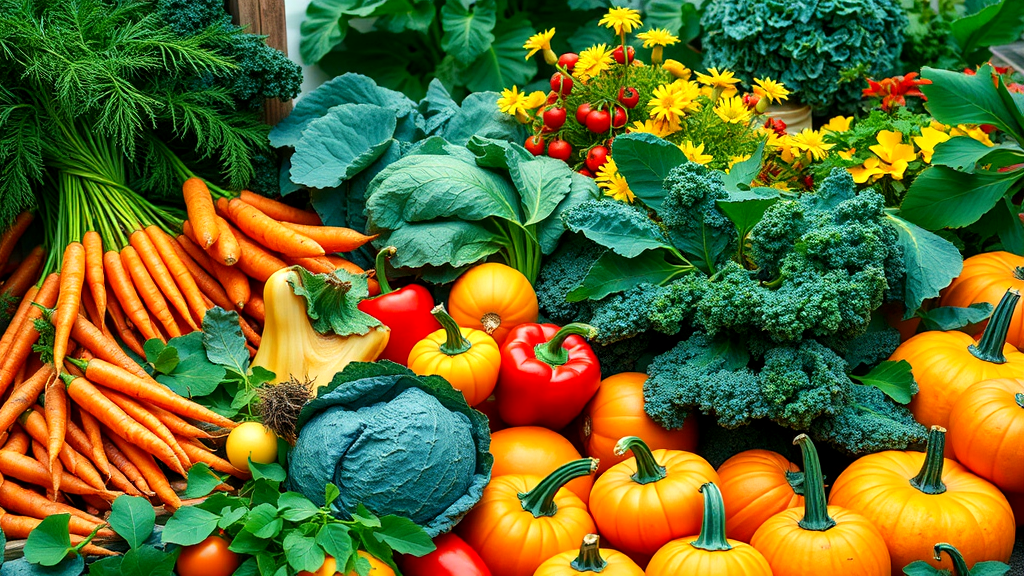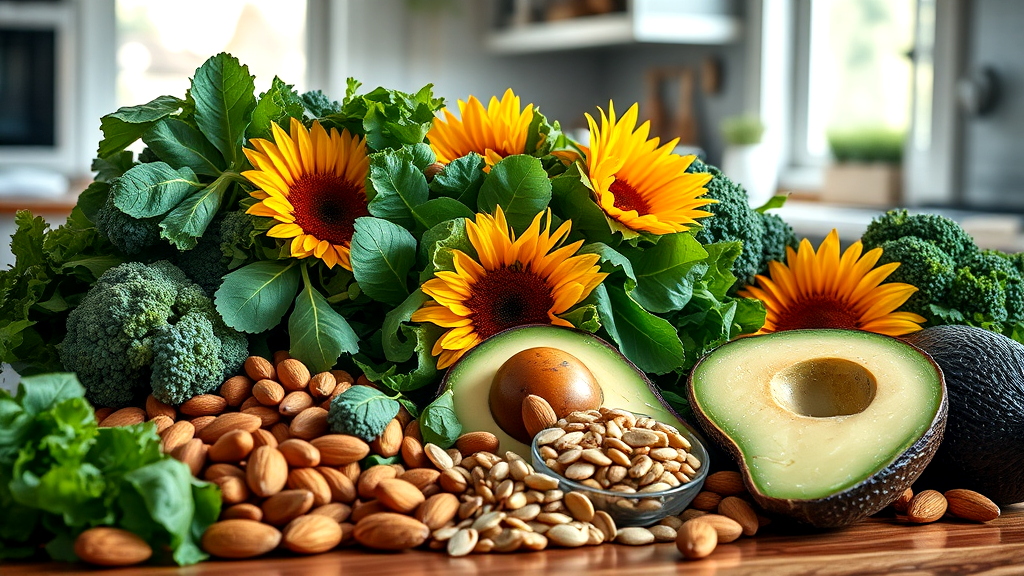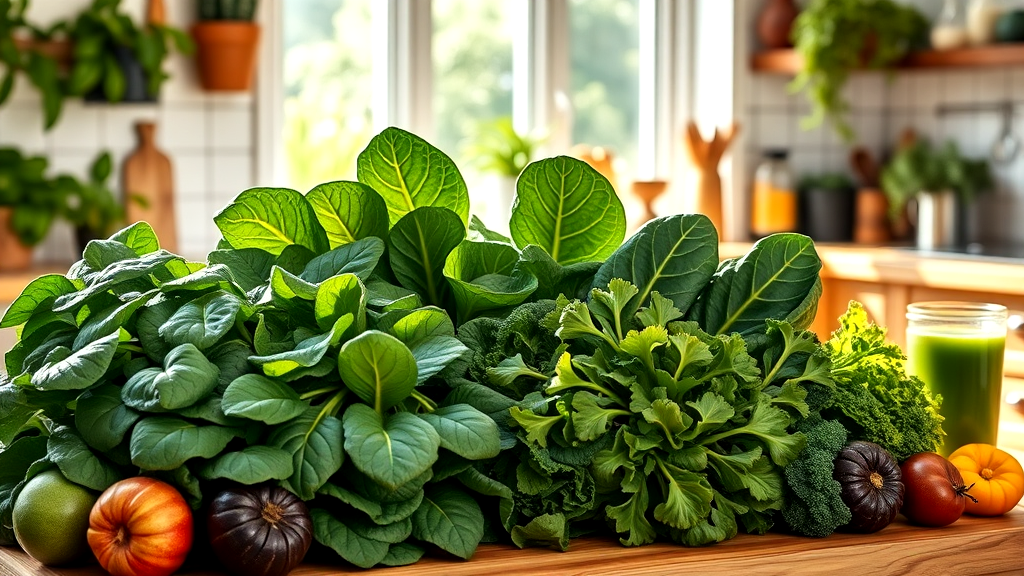
Are you feeling overwhelmed by oxidative stress? You’re not alone. This sneaky imbalance between free radicals and antioxidants can wreak havoc on your cells, like a bull in a china shop. It’s linked to conditions like heart disease and cancer and can be aggravated by pollution and smoking. But don’t despair! You can reduce oxidative stress naturally with the right foods. Fruits, vegetables, nuts, and olive oil, especially those in the Mediterranean diet, are your allies. They help neutralize those pesky free radicals. Imagine adding these delicious, antioxidant-rich foods to your plate and saying goodbye to oxidative damage. Ready to learn more about how to fight back against chronic oxidative stress? Let’s get started!
Download our free Oxidative Damage Tracker Worksheet to identify risk factors and start minimizing oxidative stress. Click here to grab your copy now!
Key Takeaways
Citrus fruits and berries are rich in Vitamin C, helping to reduce oxidative stress.
Beta-carotene in carrots and sweet potatoes boosts immunity and reduces oxidative damage.
Nuts and seeds provide Vitamin E, safeguarding cells from oxidative stress.
The Mediterranean diet, featuring olive oil and leafy greens, helps regulate oxidative stress.
Antioxidants from foods can combat the harmful effects of excessive oxidative stress.
Understanding Oxidative Stress
Grasping the nature of oxidative stress involves recognizing its role in harming your cells. This sneaky culprit can increase oxidative stress, leaving you vulnerable to various conditions. Have you ever thought about how a Western diet might be adding fuel to this fire? But don’t worry, there are delicious ways to counteract it. Eating foods that reduce oxidative stress can be your secret weapon.
Let’s chat about how certain foods, such as those in the Mediterranean diet, help in regulating oxidative stress. These foods are like little warriors, fighting off oxidative stress markers. Olive oil, for instance, isn’t just for drizzling; it supports your body’s oxidative balance. Spinach and kale also join the party, delivering a punch of antioxidants.
Here’s a fun fact: even mild oxidative stress can trigger your body’s oxidative stress response. But with the right diet, you can tip the balance in your favor. Don’t let oxidative damage control your life. Choose foods that empower you, and watch as your oxidative stress levels decrease. So, what’s on your plate today?

How Free Radicals Cause Damage
Those pesky free radicals sneak into your body through metabolic processes or environmental triggers, causing oxidative damage. Think of them as uninvited guests at a party, wreaking havoc on proteins, lipids, and DNA. This damage can be a precursor to chronic diseases like cancer. But here’s the twist—foods that reduce oxidative stress are your best allies in this ongoing battle.
Imagine antioxidants as your personal peacekeepers. They target these unruly molecules and restore cellular peace. Foods high in antioxidants, like those in the Mediterranean diet, are pivotal in regulating oxidative stress. These tasty warriors help defend against oxidative stress markers, keeping you in tip-top shape.
Ever considered how mild oxidative stress might sneak by unnoticed? Yet it’s a potential trigger for a cascade of oxidative stress responses. The good news? Your diet can be your best guard. Whether it’s the rich oils of a Mediterranean feast or vibrant veggies, these foods help you combat the silent cellular oxidative stress. Next time you plan your meals, think about how your choices might influence your body’s oxidative balance.
Importance of Antioxidants
Getting into why antioxidants are valuable, it’s all about keeping your cells in tip-top shape by fighting off those pesky free radicals. Foods that reduce oxidative stress, like berries and nuts, are your allies in this battle. They not just keep the unwanted guests at bay but also promote overall well-being.
By eating a variety of these foods, you can better manage cellular oxidative stress. Think of it as giving your insides a spa day. Even a mild level of oxidative stress won’t stand a chance if you stock up on these antioxidant-rich goodies.
The Mediterranean diet, with its emphasis on olive oil and fresh veggies, is a prime example of a diet that helps regulate oxidative stress. It’s tasty, and your body will thank you.
Want to dive deeper into this topic? I’ve got a detailed guide on how supplements can aid in reducing oxidative stress. Check it out here.
But beware of the western diet that increases oxidative stress; it’s like inviting trouble to your cellular party. Instead, focus on eating foods that naturally combat oxidative damage.

Vitamin C-Rich Foods
Exploring foods abundant in Vitamin C reveals a treasure trove of benefits. Citrus fruits like oranges and lemons are at the forefront, each bite packed with this essential antioxidant. They not just boost your immune system but play a pivotal role in combatting oxidative stress. Your skin and tissues will thank you, glowing with vitality.
Berries such as strawberries and blueberries follow closely, offering a sweet shield against oxidative stress. These tiny powerhouses can help your heart and brain function optimally, adding a delicious twist to your daily diet.
You might wonder about other sources, like tropical delights. Kiwi and pineapple sneak into the mix, offering a zesty kick while maintaining that Vitamin C punch. Don’t underestimate these vibrant fruits. Even bell peppers, unexpected as they are, pack a punch of Vitamin C, offering savory options to balance your palate.
Keep an eye on your plate. A western diet, with its processed foods, increases oxidative stress markers, leading to potential oxidative damage. Embracing a Mediterranean diet, rich in fresh produce and healthy fats, regulates oxidative stress naturally, promoting a healthier lifestyle.
Benefits of Citrus Fruits
The advantages of citrus fruits extend far beyond their juicy flavor. Packed with Vitamin C, these zesty delights are powerhouse foods that reduce oxidative stress in your body. Imagine them as tiny, tasty warriors, fighting off those pesky free radicals that cause oxidative damage.
Immune System Boost: A daily dose of citrus can help your immune system stand tall and resilient.
Skin Health: They offer a splash of Vitamin C, keeping your skin healthy and glowing.
Heart Protection: Regular consumption may support heart function and keep your ticker in top shape.
Digestive Aid: Citrus fruits also bring digestive benefits, like aiding in the absorption of iron.
Mood Enhancer: The aroma of citrus can lift your mood and ease stress.
Weight Management: Low in calories, they fill you up without weighing you (or your conscience) heavily.
Hydration: Juicy and refreshing, they’re a great way to stay hydrated.
Citrus fruits are more than just a tangy addition to your diet; they are essential foods that help in regulating oxidative stress naturally. So, the next time life gives you lemons, rejoice! You’re on the path to wellness.

Role of Berries in Reducing Stress
Exploring the role of berries in easing stress reveals how these small fruits pack a mighty punch. Berries like strawberries and blueberries are among the foods that reduce oxidative stress. Bursting with antioxidants, they fight free radicals and help maintain cellular balance. Have you ever thought about how something so sweet can be your ally against oxidative damage?
Not just tasty, berries are superheroes in the berry bowl. They support your brain and heart, and even lighten your mood. Next time you’re feeling stressed, maybe reach for a handful of these colorful gems. It’s like a little vacation for your cells, without leaving your kitchen!
And let’s not forget the Mediterranean diet, which also champions these fruits. It’s no wonder it’s a favorite for reducing mild oxidative stress. Compare that with the Western diet, and you’ll see why people swear by it. So, next time you’re at the grocery store, let your cart wander to the berry section. Treat yourself and your body will thank you later.
Beta Carotene Sources
Sources of beta-carotene often come from colorful vegetables. These vibrant foods are not just eye-catching but are significant contributors as foods that reduce oxidative stress. Carrots and sweet potatoes are popular selections, loaded with beta-carotene, which your body converts into Vitamin A. They aid in maintaining healthy vision and support immune function.
Carrots: A classic choice, rich in beta-carotene. Ideal as a snack or in salads.
Sweet Potatoes: Their natural sweetness makes them a delightful side dish. Roast them for a healthy treat.
Spinach: Not just for Popeye, spinach provides a generous dose of beta-carotene. Perfect in salads or smoothies.
Kale: Another leafy green powerhouse, kale is versatile in soups or sautéed.
Red Peppers: These peppers add color and nutrients to any meal.
Butternut Squash: Its creamy texture makes it perfect for soups or roasted with spices.
Mangoes: A tropical delight, mangoes offer sweetness and nutrition.
Pumpkin: More than just a pie filling, pumpkin is great in soups and stews.
For those interested in the broader implications of diet on oxidative stress, the Mediterranean diet has been shown to be beneficial in managing mild oxidative stress, as noted by Scarmeas et al. in their study.

Carrots and Sweet Potatoes
Incorporating carrots and sweet potatoes into your diet can be an effective way to manage oxidative stress. These vibrant veggies pack a punch with beta-carotene, transforming into Vitamin A in your body. This boosts your immune system and may help protect against oxidative damage. Sweet potatoes, with their natural sweetness, and carrots are more than just eye-candy on your plate; they are foods that can help regulate oxidative stress.
Speaking of oxidative stress, you might find it fascinating how much it intertwines with your overall wellness. The Mediterranean diet, often hailed for its heart-healthy benefits, incorporates similar antioxidant-rich foods. You can explore more about this connection and how it impacts oxidative stress here.
Both carrots and sweet potatoes are not just staples in a Western diet—they are essential allies in your fight against oxidative stress damages. Their vibrant colors aren’t just for show; they signify the presence of antioxidants. So, whether you enjoy them roasted, mashed, or in a salad, you’re doing your cells a favor. Remember, these simple choices can make a world of difference in maintaining your body’s oxidative balance.
Foods High in Vitamin E
Diving into foods abundant in Vitamin E unveils a treasure trove of benefits for those seeking to combat oxidative stress. Nuts and seeds, such as almonds and sunflower seeds, stand tall with their high Vitamin E content. They help safeguard cell membranes, acting like a shield against oxidative damage.
If you’re a fan of leafy greens, spinach and kale fit the bill, providing a double punch of Vitamin E and antioxidants. Sauté them as a side dish or toss them in your salad for an extra nutrient boost.
The goodness doesn’t stop there. Try avocados for a creamy, delicious way to enrich your diet with Vitamin E. This versatile fruit is not just for guacamole anymore; it’s a delicious dose of wellness on your plate.
For those who enjoy a bit of crunch, adding broccoli to your meals can enhance your Vitamin E intake. Want to dive deeper into the science? Check out the journal article here.

Nuts and Seeds for Protection
Exploring the protective qualities of nuts and seeds, you’ll find they are potent allies in combatting foods that reduce oxidative stress. Rich in Vitamin E, these tiny nutritional powerhouses help maintain cell integrity. Almonds, walnuts, and sunflower seeds can be your go-to snacks to keep those pesky free radicals at bay. You might even say they’re your personal bodyguards, keeping damage at arm’s length.
It’s amazing how such small foods pack such a powerful punch. Toss them in your morning oatmeal or sprinkle them on salads. It’s like adding a sprinkle of well-being to your day. Not just delicious, they also contribute to a balanced diet, complementing the antioxidant-rich Mediterranean diet.
You’ll find that incorporating these foods into your meals not just satisfies your taste buds, but also helps in regulating oxidative stress. This is something you’ll appreciate as you age, keeping your cells in fighting shape. For more insights on their impact, the journal article here delves deeper into their benefits. Who knew a handful of nuts could do so much? Eat up and let them do the heavy lifting!
The Mediterranean Diet Benefits
Examining the advantages of the Mediterranean eating habits reveals a treasure trove of perks for your well-being. This diet is teeming with foods that reduce oxidative stress, featuring vibrant fruits, leafy greens, and heart-healthy olive oil. These elements are known to combat free radicals, those mischievous molecules eager to wreak havoc on your cells. Imagine them as little superheroes in your diet, averting damage and preserving cellular harmony.
Olive Oil: A key player, offering anti-inflammatory benefits and aiding oxidative equilibrium.
Berries: Packed with antioxidants, these jewels help maintain brain and heart vitality.
Nuts and Seeds: Rich in Vitamin E, they shield your cells from free radical mischief.
Green Leafy Veggies: Spinach and kale are nutrient powerhouses, promoting an antioxidant-rich lifestyle.
Citrus Fruits: Delivering Vitamin C, they bolster your immune system and skin resilience.
Tomatoes: Bursting with lycopene, they support heart function and minimize oxidative concerns.
Whole Grains: Boost fiber intake, fostering digestive and heart wellness.
Legumes: A plant-based protein source, they enhance diet diversity and oxidative balance.
Curious about more ways to handle oxidative stress? I discuss this further in How to Lower Oxidative Stress.

Olive Oil and Oxidative Balance
The harmony between olive oil and maintaining oxidative balance is essential. Enriched with monounsaturated fats and antioxidants, olive oil is a key player in foods that reduce oxidative stress. It’s like a shield, protecting your body from harm. The oil’s benefits don’t stop there. It also supports heart and brain wellness, as part of the celebrated Mediterranean diet.
Switching from a Western diet to one rich in olive oil can feel like a breath of fresh air. You might wonder how it works so well. The magic lies in its ability to combat inflammation and support overall cellular function. This little gem is a game-changer in the fight against oxidative stress.
Imagine a world where your energy levels are up, and your mood is elevated, all thanks to olive oil. It’s not just a kitchen staple but a life enhancer. You’re not just cooking; you’re investing in your well-being. So, why not drizzle a little extra on your salad? Your body will thank you. You’ll notice the difference in how you feel, as olive oil harmonizes your oxidative balance.
Green Leafy Vegetables
Those greens packed with antioxidants are your best companions in battling those pesky free radicals. Leafy greens like spinach and kale are nutritional powerhouses. They are an essential part of foods that reduce oxidative stress. Their high levels of vitamins like A, C, and E make them superheroes in fighting free radicals. You’re not just eating veggies; you’re arming yourself with nature’s defense squad. Have you tried them in a smoothie? It’s a delicious way to sneak in your daily dose.
Not a fan of spinach or kale? No worries, alternatives like Swiss chard and collard greens also pack a punch. They bring fiber and folate to the table, aiding in detoxification and cell repair. Switching your Western diet to include more of these greens can have tremendous benefits. Interested in knowing more about how your lifestyle affects your oxidative levels? You might find my test for oxidative stress handy.
Incorporating leafy greens into your meals is like inviting a team of bodyguards to protect you. So, dive into the world of greens and give your body the gift it deserves!

Spinach and Kale Impact
Spinach and kale, those green dynamos, are a formidable force among foods that reduce oxidative stress. Imagine them as tiny, leafy superheroes, swooping in to save the day. Their antioxidant arsenal is impressive, featuring nutrients like lutein and zeaxanthin that fend off free radicals. If you’re keen on maintaining your cellular harmony, these greens are your allies.
These leafy delights not just excel in antioxidants but also pack a punch with fiber and essential vitamins. If you’re looking to shift from a western diet to something more vibrant, embracing these greens can be a game-changer. Toss them into salads or blend them into smoothies; they’re easy to incorporate into your meals.
Have you ever thought about jazzing up your Mediterranean diet with these greens? It’s a delightful twist that could help with regulating oxidative stress. Their role in maintaining cellular equilibrium is akin to a well-oiled machine, ensuring everything runs smoothly. So, the next time you see these greens at the market, remember you’re not just buying vegetables; you’re investing in your body’s defense.
Impact of Chronic Oxidative Stress
The ongoing stress from oxidative imbalances can lead to significant cellular disruption. This disruption paves the way for diseases like cancer or heart ailments. Now, you might wonder how to combat this relentless foe. Enter the world of foods that reduce oxidative stress. Picture them as your culinary knights, ready to defend your cells.
Switching to a diet rich in antioxidants is a smart move. Think colorful fruits, vibrant vegetables, and the wholesome Mediterranean diet. Such foods keep those pesky free radicals at bay. Yet, if you’re still clinging to a Western diet, it’s time to reconsider.
Integrating these foods into your meals can be as simple as a sprinkle of nuts or a drizzle of olive oil. It’s like giving your body a refreshing, protective suit of armor. Plus, they’re delicious! So, why not treat yourself to a berry smoothie or a leafy green salad? Your cells will thank you.
By embracing these dietary changes, you’re not just eating; you’re investing in a healthier future.

Conclusion
Incorporating foods rich in antioxidants can be a game-changer for your overall well-being. By focusing on a diet filled with Vitamin C, beta-carotene, and Vitamin E, you help your body combat the harmful effects of free radicals. Think of citrus fruits, like oranges, or vibrant berries, as your tasty allies.
Adding carrots, sweet potatoes, nuts, and seeds into your meals can support your body’s defenses. Moreover, adopting a Mediterranean-style diet introduces a variety of beneficial foods, from olive oil to greens like spinach and kale. These choices not just enhance cellular protection, but also improve your long-term wellness.
By making these simple dietary changes, you’re taking a proactive step toward reducing oxidative stress. Remember, what’s on your plate can be your best ally in the fight against chronic diseases.
FAQ
What is oxidative stress, and why does it matter?
Oxidative stress happens when free radicals outnumber antioxidants in your body. This imbalance can harm cells and is linked to diseases like cancer and heart disease. Environmental factors like smoking can worsen it, but antioxidant-rich foods can help.
How do free radicals cause damage in the body?
Free radicals are unstable molecules that damage proteins, lipids, and DNA. They’re generated by natural processes or factors like pollution. This damage can lead to chronic diseases. Antioxidants neutralize these radicals to protect cells.
Why are antioxidants important for my diet?
Antioxidants neutralize free radicals, preventing cellular damage. They’re crucial for reducing oxidative stress, lowering chronic disease risk, and supporting overall wellness. Eating foods high in antioxidants can boost your long-term well-being.
Which foods are rich in Vitamin C, and what benefits do they offer?
Citrus fruits like oranges and grapefruits are excellent Vitamin C sources. They reduce oxidative stress, support the immune system, and aid skin repair. Berries like strawberries also offer similar benefits, improving heart and brain function.
How does the Mediterranean diet help with oxidative stress?
The Mediterranean diet is rich in antioxidants. It includes foods like olive oil, which supports oxidative balance and reduces inflammation. This diet is associated with numerous benefits, including decreased oxidative stress.



